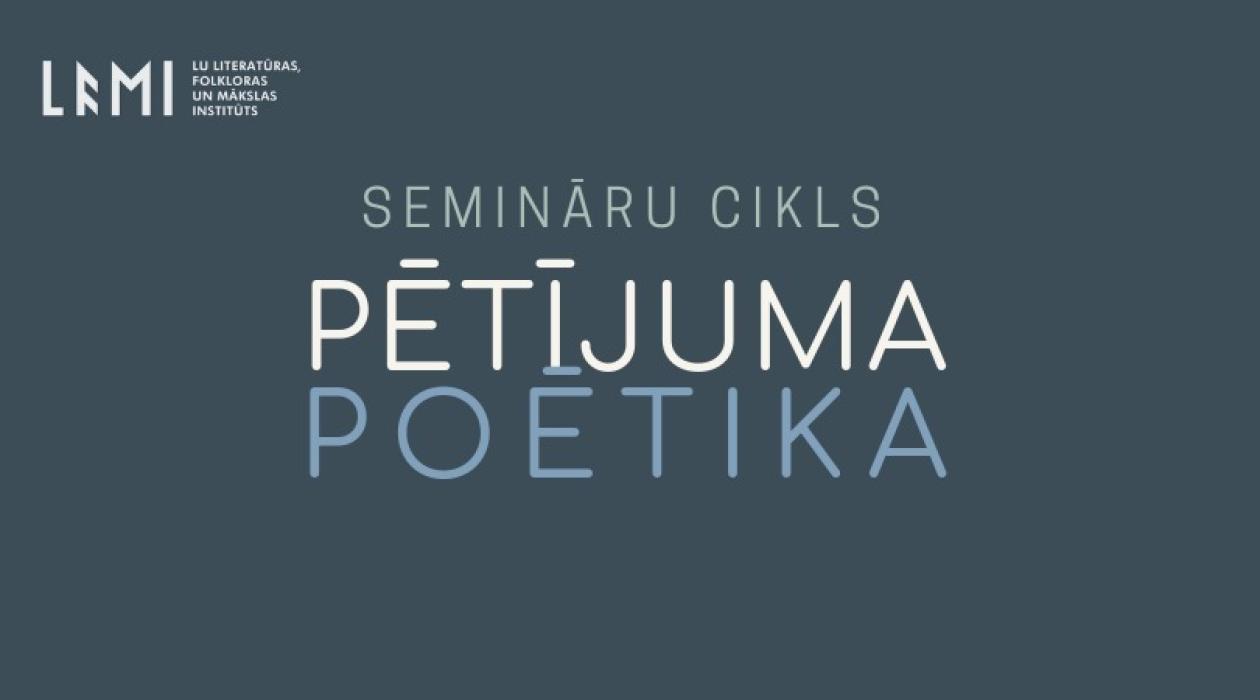The Poetics of Research on November 6

In connection with the elections to academic positions at the University of Latvia Institute of Literature, Folklore and Art (ILFA), you are invited to the “Poetics of Research” seminar on Wednesday, November 6, in the reading room of the Archives of Latvian Folklore, ILFA, on the 5th floor of the National Library of Latvia. The program will feature the following presentations:
10:00 – Zita Kārkla – In Search of the Latvian Virginia Woolf: Dialogues Between Canonical and Lesser-Known Women Writers
Using Virginia Woolf’s writing as a point of reference, this talk examines how Latvian authors—such as the canonized Regīna Ezera and the lesser-known Alija Baumane—used experimental literary techniques to create space for revealing women’s experiences and subjectivity. Possible links between Virginia Woolf and Latvian women writers are explored in the context of Susan Stanford Friedman’s call to “spatially expand modernism” and related transnational modernist studies, which are feminist and intersectional, as well as Paul Saint-Amour’s concept of “weak modernism”—an alternative to the traditionally masculine and Eurocentric “strong modernism.” Special attention will be given to Baumane’s prose of the 1920s–1930s. A writer from a small Eastern European country with no evidence of connections to transnational modernists, Baumane was certainly a “weak modernist.” At the same time, her style and choice of themes foster dialogue with other modernist women writers of the early 20th century, who sought to shape a new, embodied female subject and to depict emancipation as a deep, sensual necessity.
11:00 – Digne Ūdre-Lielbārde – Folklore, Traditional Culture, and Commercialization
The commercialization of folklore and traditional culture is a subject of ambivalent evaluation among both researchers and the public. On one hand, in today’s neoliberal economy, commercialization often gives new life to traditions and folklore-related elements, contributing to their preservation and popularization. Creative engagement with cultural heritage—beyond simple reproduction of the past—can integrate new forms and content into contemporary life. Folklore elements reshaped in commercial formats can gain added market value and, on an individual level, serve as expressions of identity and belonging. On the other hand, commercialization raises legitimate concerns about the trivialization of traditions and the reduction of folklore to tourist souvenirs, low-quality products, and tasteless kitsch. Globally, these issues intersect with the concept of cultural appropriation; locally, they involve the devaluation of traditional cultural elements and excessive nationalistic sentiment. The first part of the presentation offers a theoretical overview of folklore and traditional culture in relation to commercialization; the second focuses on the contemporary use of Latvian ornament as a vivid example.
12:00 – Simona Sofija Valke – Nerve Art? Maeterlinck in the Baltic German Reception
From time to time, literature experiences periods of uncertainty, reevaluation of values, and redefinition of its mission, destabilizing established literary norms. In France and Belgium, the final decades of the 19th century were marked by fin-de-siècle literature, where “critics constantly confused decadents with symbolists” (Bajou, 1892). Among these diverse works, the plays and poems of Maurice Maeterlinck stood out for their hermeticism and lexical innovation, attracting both admirers and detractors. The Belgian author’s popularity extended far beyond the French-speaking world and was actively discussed in the German-speaking sphere. The first article in German on Maeterlinck (1891) was written by Austrian writer and critic Hermann Bahr, who a year later gave a lecture before a performance of The Intruder in Vienna, praising symbolism as a “nerve art” (Nervenkunst) and proclaiming it the future of literature. His favorable reception was continued by Monty Jacobs and Felix Poppenberg, while Max Nordau offered a harsh, medically framed critique. The Baltic German press reported on Maeterlinck earlier than Latvian periodicals did, including him in general reviews of new literature, offering translations, and presenting a diversity of opinions about his literary quality. The presentation examines the portrayal of Maeterlinck’s symbolist works in the Baltic German press and identifies privileged aspects of cultural transfer from the German sphere.
All are welcome to attend.